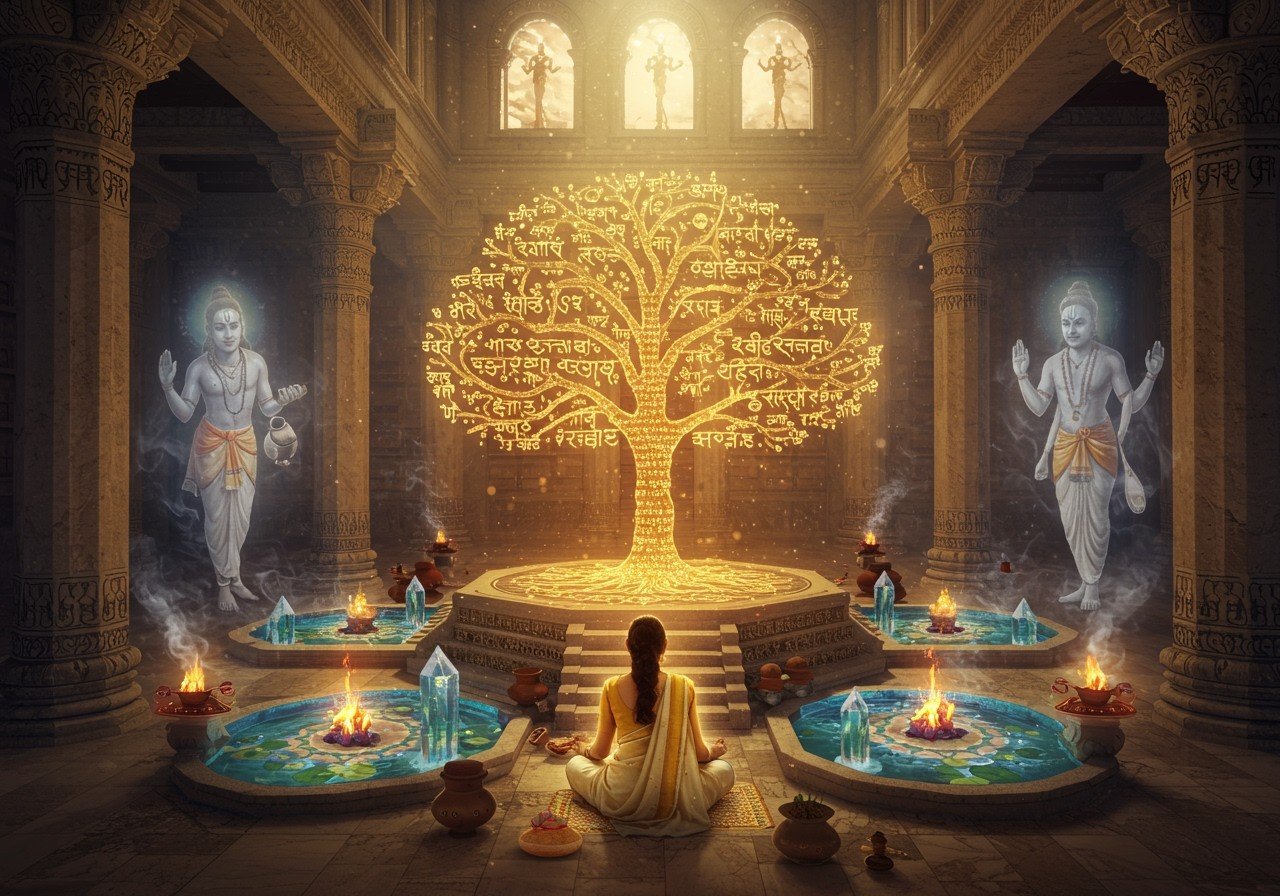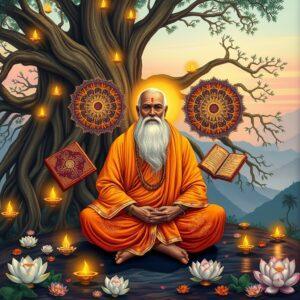
The Vedas, the oldest sacred scriptures of Hinduism, composed in ancient Sanskrit, are foundational to Indian spirituality and culture. They encompass hymns, prayers, and rituals that significantly influence Hindu thought and practices. Key philosophical concepts from the Vedas include Dharma, Karma, Moksha, and Brahman, which continue to shape Hindu beliefs. The Vedas have profoundly impacted ancient Indian society, affecting social stratification, the role of priests, governance, and daily life, while their rituals and hymns remain integral to Hindu worship and religious ceremonies.
Origins and Composition of the Vedas
The Vedas are a collection of hymns, prayers, and rituals composed in ancient Sanskrit between 1500 and 500 BCE. There are four main Vedas: Rigveda, Samaveda, Yajurveda, and Atharvaveda. Each Veda is structured into four sections:
- Samhitas: Collections of hymns and mantras, forming the core of each Veda and offering praises to various deities.
- Brahmanas: Prose texts explaining the rituals and their significance, providing instructions for priests and offering interpretations of the Samhitas.
- Aranyakas: Philosophical interpretations of the rituals, delving into their symbolic meanings and exploring deeper spiritual concepts.
- Upanishads: Philosophical and spiritual teachings that explore the nature of reality, the self, and the ultimate truth, forming the basis of Vedanta philosophy.
Initially transmitted orally by Brahmin priests, the Vedas played a crucial role in shaping early Hindu society and religious practices.
The Vedas and Hinduism
The Vedas are the bedrock of Hindu religious beliefs and practices. The concept of Dharma (righteousness and duty) is central to Hinduism and is emphasized throughout the Vedas. Rituals such as Yajnas (fire sacrifices), described in the Vedas, continue to influence modern Hindu worship. Key philosophical ideas from the Upanishads, such as Brahman (the ultimate reality) and Atman (the individual soul or self), have profoundly influenced Hindu theology and spiritual practices.
Vedic hymns and mantras are still recited in contemporary Hindu ceremonies and festivals, demonstrating their enduring relevance. For those seeking to deepen their understanding and practice of these traditions, Poojn.in offers a wide selection of authentic puja items and resources:
- Incense Sticks: Enhance your prayers and meditation with fragrant incense sticks made from traditional ingredients. Poojn.in offers a wide variety of scents and brands.
- Sindoor Containers: Keep your sindoor fresh and protected in beautifully crafted containers, perfect for daily use or special occasions.
The Vedas and Hindu Mythology
The Vedas have significantly impacted Hindu mythology. They contain stories of creation, cosmology, and the origins of the universe. Important Vedic deities, such as Agni (the fire god), Indra (the king of the gods), and Soma (the divine drink), feature prominently in Hindu mythology. Later texts, like the Puranas, expanded on these Vedic myths, creating a rich tapestry of stories and characters that continue to inspire and inform Hindu beliefs and practices.
Explore the rich tapestry of Hindu mythology with Poojn.in’s curated collection:
- Laddu Gopal Murti: Bring the blessings of Lord Krishna into your home with a beautifully crafted Laddu Gopal deity statue.
- Brass Puja Items: Enhance your puja rituals with authentic brass items, including bells, lamps, and plates, available at Poojn.in.
Impact on Indian Culture and Society
The Vedas have profoundly influenced various aspects of Indian culture and society. They have shaped literature, philosophy, art, music, and social structures. Vedic principles have influenced family dynamics, social hierarchies, and the concept of the caste system. Vedic rituals play a central role in traditional ceremonies, such as weddings and festivals. Ayurveda, the traditional Indian system of medicine, draws heavily from Vedic knowledge. Jyotish, Vedic astrology, also has a significant impact on Indian beliefs and practices.
Preservation and Modern Relevance of the Vedas
The preservation of the Vedas is crucial for maintaining India’s cultural heritage. Scholars, religious institutions, and traditional Vedic schools (Gurukuls) play an essential role in transmitting Vedic knowledge to future generations. The Vedas continue to offer valuable insights into contemporary issues such as environmental conservation, social justice, and personal well-being. Vedic mantras and practices are increasingly popular in modern spirituality and wellness trends. Online resources have made Vedic texts accessible to a global audience, fostering a wider appreciation of Indian culture and spirituality.
Conclusion
The Vedas are not merely ancient texts but a living tradition that continues to shape Hindu beliefs, rituals, and the cultural fabric of India. They provide a framework for understanding Dharma, the significance of rituals, and profound philosophical concepts like Brahman and Atman. By studying and preserving the Vedas, we honor our heritage and ensure that their wisdom continues to inspire and guide future generations. In a world where ancient traditions intersect with modern practices, the Vedas offer timeless wisdom and a deeper understanding of our cultural identity.


